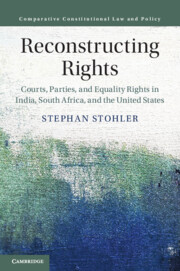 Reconstructing Rights
Reconstructing Rights 7 - Equality Rights in South Africa
from Part IV - South Africa
Published online by Cambridge University Press: 09 July 2019
Summary
In this chapter, I test the deliberative partnership thesis and its competitors against the behavior of the African National Congress (ANC) and aligned justices on South Africa's Constitutional Court. These justices were instrumental in developing a doctrinal approach to the Constitution's Equality Clause, which reflected a constitutional vision associated with President Nelson Mandela and stressed reconciliation between South Africa's various cultural groups after apartheid. But when Mandela's successor, President Thabo Mbeki, oversaw the expansion of affirmative action, Mbeki risked conflict with the justices that the ANC had previously appointed. Again, however, this conflict did not materialize. Instead, many of the same justices began to elaborate new doctrinal positions pursuant to a transformational constitutionalism that stressed greater opportunities for the historic victims of apartheid. But when the ANC-aligned justices attempted to expand these egalitarian understandings to cases involving socioeconomic rights, they encountered stiff resistance from the ANC and subsequently capitulated, which is consistent with the deliberative partnership thesis.
Keywords
- Type
- Chapter
- Information
- Reconstructing RightsCourts, Parties, and Equality Rights in India, South Africa, and the United States, pp. 189 - 220Publisher: Cambridge University PressPrint publication year: 2019
